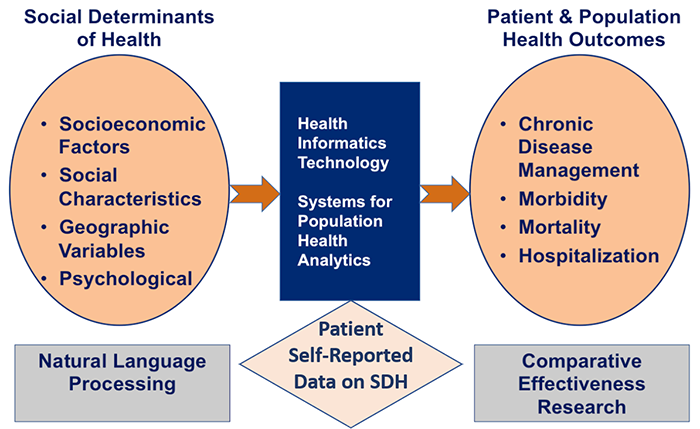
|
|
March 2022In This Issue: HSR&D Research on Social Determinants Data-Driven Methods to Identify Social Determinants of HealthFeature ArticleTakeaway: This project will use health information technology to address social determinants of health that contribute to health disparities in minority populations and other underserved groups in a multi-step process that will identify patients with social risk factors and implement an assessment process that will lead to improved patient outcomes. As a result of empirical evidence showing that a patient’s social background is associated with their health behaviors and clinical outcomes, there is increased attention on social determinants of health (SDH). Ideally, identifying and documenting a patient’s social background would be followed by referral to services that address the social determinants of health that are most likely to reduce compliance with recommendations for disease prevention, treatment, and management. However, social determinants of health such as education, income, social isolation, and financial strain are rarely documented during routine care visits. A systematic approach is needed for health information technology to be effective at addressing minority health and health disparities. The first step to developing a more robust data-driven strategy for identifying social phenotypes among patients is to understand the extent to which social determinants of health are being documented in the electronic health record (EHR). Natural language processing (NLP) is one strategy to automatically extract those data from clinical notes in the EHR into a structured format that can be used to examine the patient’s quality of healthcare and facilitate the development and implementation of quality improvement strategies. However, NLP approaches alone are not sufficient to improve the quality of healthcare for Veteran racial/ethnic minorities. This is because poor quality communication between patients and providers and greater distrust in the healthcare system among minorities may limit discussion of these factors. Social phenotypes refer to specific social behaviors used in a range of social environments. This ongoing study (October 2021 – September 2025) seeks to develop a multilevel health informatics approach for identifying social phenotypes among primary care patients based on documentation of SDH in the electronic health record. Specific aims include:
Investigators also will characterize referrals to clinic-and community-based services based on the patient’s social phenotype. Methods A deep learning NLP approach will be used to characterize the rates at which social determinants of health are documented in the electronic health record. Machine learning strategies will be used to identify social phenotypes based on social determinants of health. 
Findings None to report at this time. Anticipated Impact This project will use health information technology to address social determinants of health that contribute to health disparities in minority populations and other underserved groups in a multi-step process that will identify patients with social risk factors and implement an assessment process that will lead to improved patient outcomes. Principal Investigator: Lewis Frey, PhD, is part of HSR&D’s Charleston Health Equity and Rural Outreach Innovation Center (HEROIC) in Charleston, SC. Publications None to report at this time. |
|